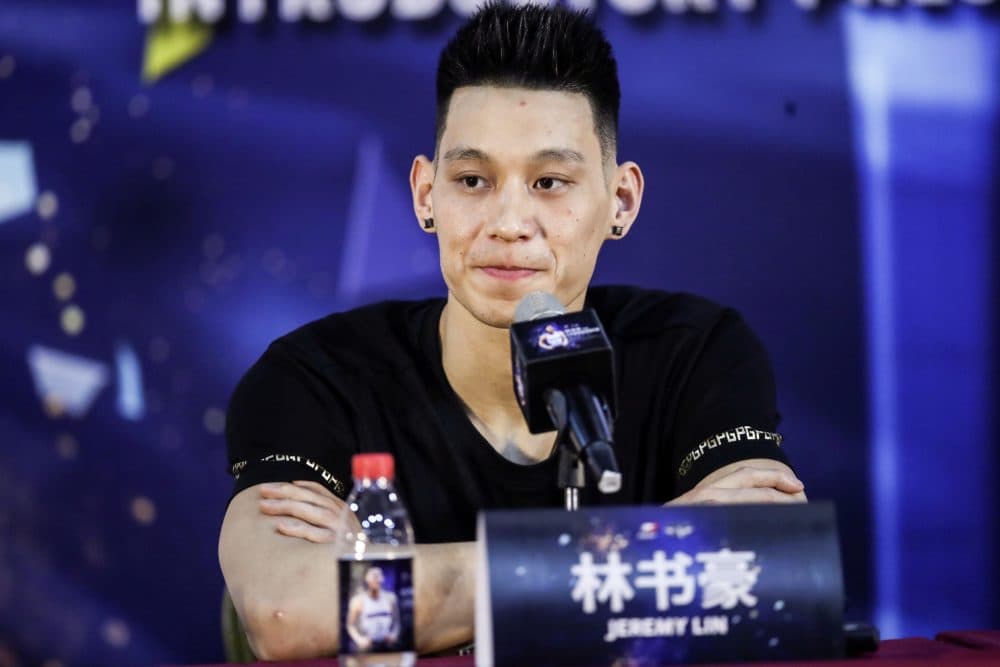Advertisement
Jeremy Lin: Seeing The COVID-19 Pandemic From Both Sides Of The Pacific
Resume
Despite all the information coming at us from TV, radio and the internet, most of us only actually see the COVID-19 pandemic from where we are right now. That's one of the consequences of being asked to stay at home. But former NBA player Jeremy Lin has had the chance to see what's happening from both sides of the Pacific.
Lin is probably best remembered for "Linsanity," those 19 days in 2012 when he was the unlikely star of the New York Knicks. And last year with the Toronto Raptors, he became the first Asian American to win an NBA title.
This week he joined us on Only A Game.
KG: So I want to start by taking you back to January. You were in China playing — as you've described it — "with confidence and joy," averaging 24 points per game for the Beijing Ducks. Then COVID-19 hit and the season was suspended. At that time, were you really aware of the gravity of what was happening with this virus?
JL: Uh, definitely not. And, you know, I kind of wrote about it in a Players' Tribune article, but for me it was just — I think it was just one of those things where it didn't really hit home. And I was kind of in a place where I was worn down with the season. So I was kind of just, like, really thinking only about myself, and it just didn't seem as real to me.
"Even when I was going to the grocery store, it became so clear that, like, yeah, people were looking at me a certain type of way. And I wasn't comfortable at all."
Jeremy Lin
And so, yeah, it's definitely one of my big regrets. But I think a blessing in disguise is that it allowed me to kinda launch my "Be the Light" campaign and to have a deeper conviction. I guess it's not great that it came from not having conviction at all in the beginning, but at least the conviction came eventually.
KG: We're definitely gonna talk more about the "Be the Light" campaign. But first I want to take you through a little bit more of the timeline. So after the season was suspended, you flew home to California. What did you see when you were there? And what did you start to hear from other Asian Americans about what they were experiencing?
JL: Honestly it wasn't so much about what I was hearing or reading. It was real for me when I went back. And, like, I remember talking to people, and they're like, "Yeah, like, I don't know whether I should go to the grocery store or not." I'm like, "What? Why wouldn't you?" And they're like, "I'm scared. Like, if I put on a mask, I feel like I may be attacked. And if I don't put on a mask, then I feel like I might get sick."
And so it was kind of, like, dealing with those issues. And then even for me, at that time, California went into lockdown. Ao I actually had a mask, and I was going to the grocery store to stockpile. And, you know, I wasn't sure how long we were going to be in lockdown. And even when I was going to the grocery store, it became so clear that, like, yeah, people were looking at me a certain type of way. And I wasn't comfortable at all. And so that's when really for me it was — it became extremely real.
KG: Wow. And how different is that from your normal experience?
JL: I mean, normally ... for me, where I grew up in Northern California, it's very diverse. And so normally Asians don't have any issues in terms of just being out and about. And there's no looks that you'll get or anything. You know, obviously I've experienced that on the court. But from a day-to-day life standpoint, I've never experienced that.
"Going to the grocery store and being afraid for your health is very different than going to a basketball game and getting racist remarks thrown at you."
Jeremy Lin
And on top of that, I would say the court is — you're talking about verbal. And even online, that's verbal. But this is physical. When people look at you a certain type of way, or, you know — I think maybe it was Andrew Yang who kind of said, like, everybody knows somebody who's been attacked, or every Asian American knows another Asian American who is struggling with this. Like, that's true. And so going to the grocery store and being afraid for your health is very different than going to a basketball game and getting racist remarks thrown at you.
KG: So then you flew back to China in March because the CBA season was scheduled to resume, and you were immediately put into quarantine. Can you describe that for me?
JL: The quarantine? Oh, man. Fourteen days. You can't step outside the room. You can't come in contact with any human. The meals are dropped outside your door three times a day. And then when you're done, you put the trash outside, and someone else will come by and pick it up. It's a tiny little room, barely enough for just a desk and a bed.
So I actually ended up moving everything — I moved my chair, I moved my bed, I moved everything and pushed it as far into corners as possible, so that I could have a little bit of space to do my own workouts and stay in shape. And so, you know, I did crazy stuff. I was running from the door to the wall, and I did that 400 times. And I was doing that with, you know, bouncing a basketball and doing different moves and doing different weightlifting exercises — obviously without real weights or anything — but just trying to stay as much in shape. And so, it was a unique experience, but it reminded me of just so many things that I kind of took for granted before.
KG: And it also gave you a lot of time to think. So what conclusions did you start to reach as you had all this time — these 14 days?
JL: I mean, the first thing that I thought about was, "OK. I'm here in a 14-day quarantine, but I'm quarantining mainly out of procedure and protocol." But my teammates had to quarantine for 21 days, a month. People in Wuhan had to quarantine for months at a time. And some of them, you know — a lot of them — were actually sick and dealing with that. And then I start to think about, you know, "Well, what happens if I did have it? What happens if I was sick? Or what happens if I was somebody who was sick, and I lived alone?"
All these different thoughts that I was having, I was just like, "Wow, like, why didn't I take this more seriously earlier?" And even a couple of days where I woke up with sore throat, and it was really just a change in climate — the fear that I had was very real.
KG: So soon after that you posted a video to your Instagram feed.
KG: You said you don't usually make these kinds of videos. What inspired you to make one this time?
JL: I just feel like, for me, social media has always kind of just been something — you know, I have my own style. And I just post photos, and I try not to have long captions and whatever. But recently, I mean, I'm just like, "Man, forget what my preferences are." It's like, I need to do whatever it takes. And so for me, I've been filming videos. I'm speaking into the cameras. I'm having very informative, long captions, which are normally my pet-peeve. And even just asking people for something is just something I really don't like doing. I don't like asking people for anything.
And so I think at this point it's like: I'm at a point where I'm a little bit more desperate of like, "Hey, people are dying, and people are hurting, and the world is, in some ways, becoming more and more divided and hostile. What can I do to be a part of building bridges versus burning them?"
KG: You also wrote in the Players' Tribune, "COVID-19 shouldn’t be about East vs. West, politics, race or anything other than helping as many people as we can survive. Serving as many hungry people as we can. Comforting as many fearful people as we can. Loving as many hurt people as we can — physically, mentally, emotionally, spiritually." And that was the official launch of your "Be the Light" campaign. How have people responded to what you wrote?
JL: It's been very hot and cold. I would say there's definitely one group who are really upset and say certain things about me and attack my character and whatnot. And that's gonna happen. That's, you know — that's just a reality of life. And I just tune that out. Um, you know, for me it's like, "Look, I know what I'm doing. I know the money that I'm donating. I know my heart behind it all."

And so — on the flip, there's been so much positive reception, and that's far outweighed the negative reception. And the positive reception is, you know, even with Direct Relief, Feeding America, they're like, "We've worked with a ton of athletes. We've worked with a ton of celebrities. What your campaign has done has been very, very impressive." I think at this point we have raised around $1.2 million, including my donations and matchings. But I think there's more coming in, and there's other stuff that's going to be going on.
I'm looking at some of these other campaigns, and I'm looking at their numbers and how many followers they have. And I'm like, "OK, if you just do simple math, like, I have maybe like one-fifteenth or one-twentieth or one-thirtieth of some of these followers." But when you actually look at them, like, what my fans have done — again, it has nothing to do with — I'm not, like, tooting my own horn. I'm just saying I've been blown away at what happened and how people have rallied. And even other celebrities and other people who have been a part of it — even Lecrae coming on and joining forces. It's been amazing to see just how many people want to help and are really interested in doing that.
KG: One last thing before I let you go: You said in your Instagram post — and I'm going to do an exact quote here — "When all is said and done In-N-Out on me." Can we hold you to that?
JL: I got you. You want In-N-Out? I got you. Just let me know. Well, hold on. Are you on the East Coast?
KG: Yeah, unfortunately.
JL: Well, hey, when we're both on the West Coast, I will get you as much In-N-Out as you want. I can definitely do that for you. No problem.
Check out Jeremy Lin's recent Players' Tribune essay "The Darkness Has Not Overcome It." You can join him in supporting Direct Relief and Feeding America here.
This segment aired on May 23, 2020.
